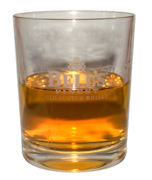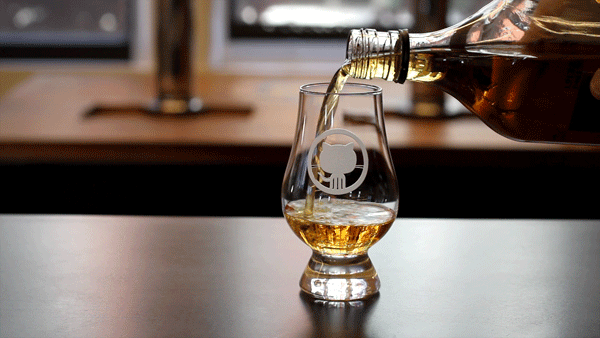

Whisky Connoisseur
Arthur J A Bell
Bell vs Bell, or a Tale of Two Whiskies


Whisky Connoisseur
Arthur J A Bell
Bell vs Bell, or a Tale of Two Whiskies

Dickens opens his masterpiece "A Tale of Two Cities" with the words "It was the best of times; it was the worst of times." So it was for my wife Susan and I some twelve years ago when we found ourselves locked in battle in Scotland's Court of Session with a multi-national giant. All over the right to the use of a name in marketing whisky.
For some ten or more years we had sold malt whiskies by post through our Scotland Direct and Scottish Gourmet businesses. All this time I had refused to sell a blended whisky, although they are cheaper, as I did not believe that they came up to the "Gourmet" standards.
There was much weeping, and wailing, and gnashing of teeth, when Scotland's last really large independent whisky company, Arthur Bell & Sons of Perth, was sold off after a hostile takeover bid by Guinness the giant Irish brewing organization (the picture of the gate to their Dublin Brewery is via Wikipedia). Public fury in Scotland was rife, and publicans were taking off the "Bells" brand from the gantries in response to the public reaction. Then a great Scottish entrepreneur Jimmy Gulliver, whose father had been a grocer in the whisky producing centre of Campbeltown, decided to launch a bid for the sleeping giant D.C.L. (Distillers Company Ltd). The public rather liked the idea, but the somewhat comatose directors of DCL and the "chaps" in the City of London, thought it was not such a good idea, opposed Gulliver's bid, and sent for a "White Knight". He duly arrived in the form of Mr. Ernest Saunders, an Austrian gentleman, who headed up the Guinness conglomerate. Somewhat doubtful financial dealing began, which were later to lead to the imprisonment of the white knights whose armour was tarnished, rather than shining.
Meanwhile, back in the small Borders burgh of Biggar I made two phone calls- one to my lawyer, and one to my PR chum. "Hamish", I said to my lawyer, "I would like to produce a very high quality blend to my specifications, and call it "Scottish Gourmet", but I'd like to add my signature to the label. Do you think that would be legally alright, because the other Bells might come after me? " His reply, "No problem, Arthur Bell is your name, and they can't stop you." My PR chum was asked "Ewan, what do you think the reaction of the Scottish media and public would be if I launched a blended whisky called "Scottish Gourmet", but with my signature on the label?" "My God, Arthur, the reaction would be explosive!" came his response.
So after discussions with a distiller, family owned still, we came up with a blend of aged Glenfarclas, Glenfiddich, and Balvenie from Speyside, with the superlative Springbank from Mr Gulliver's Campbeltown. They were blended with single grain from the Highlands that was aged well over ten years. Our designer came up with a Scottish Gourmet label, with the signature "Arthur J A Bell" fairly prominent at the top of the label. Next stage the launch.
Well, Scottish journalists are not noted for their temperance. A Glasgow Public House was duly booked, invitations issued, and the great day arrived. No less than five scribblers, with a couple of photographers appeared The next day some splendid coverage achieved, and we were launched. "New Bells in Whisky Start-up" was the press theme.
That night Susan and I were surprised by the arrival of two somewhat heavy gentlemen at our house quite late at night. "Are you Mr. Arthur Bell? We have here an injunction signed by Lord Stewart at the Court of Session in Edinburgh, preventing you selling whisky under the name Arthur Bell"!
"Splendid, I've been hoping you might arrive, do come in gentlemen" was my reply, which rather took them aback. "Would you like a dram, this being a cold night, and you've come far?" The bottle of Scottish Gourmet was produced, several large measures poured, and the bottle label compared with "Bells", "Yours isn't called Bells then," said the Sherriff's Officers, "and its much nicer than Bell's too!"
A small notice appeared in several newspapers the next day prematurely announcing the death of the brave new venture into whisky by the small businessman from Biggar. Banned!
Monday morning after calls to the lawyers checking that we were correct, a much larger Glasgow pub was booked for a press conference to announce that we were not giving up.
So on Wednesday, six days after the original launch, I walked into a media circus. There were over forty journalists, two television crews, and several radio station news hounds awaiting. Timing is everything in PR! The battle for control of over 50% of the Scotch Whisky industry was becoming big news, and here was this little business cocking a snoot at the whole bunch of "Establishment" figures who were battling for billions of pounds. "Isn't this a David and Goliath battle, Arthur?" asked one of the press "Yes, and you'll remember who got stoned" came my reply. "Are you a millionaire, Mr Bell?" came one of the next questions. No, but I hope to be soon" I quipped. The press guys loved it. No small business can hope to get prime time news coverage on both major channels in Britain, but we got it. The next day's stories were universally supportive "Bell in Ding-Dong Battle" rang the headlines. Even the ultimate establishment "Times" from London was on our side.. and so on to the Court of Session to contest the injunction. (The graphic here is of the Law Courts in Parliament Square in Edinburgh where the Scottish Court of Session is located).
We had as a counsel, an advocate who was so incensed at the takeover of his favourite dram by Guinness that he was prepared to take our case without the usual charges! We had assembled as part of our evidence fourteen bottles of whisky with the name "Glenlivet" on the label, although only one is allowed to call itself "The Glenlivet". The name of the Glen was largest on "Dufftown Glenlivet"... a distillery owned by none other than "Bells"! Four different Port bottlings showed that there were different bottlers with the name "Cockburn" on their labels, and remarkably there were five families called "Grant" in whisky ....all with signatures on the labels.
The Lord Clyde presided, and when Bell's counsel began with the words "There can only be one Bells, my lord", he intervened. "I rather thought that was what I was here to decide." Round one to the wee guys we felt.
As the hearing progressed a gentleman sitting on my right began to get somewhat agitated at the evidence being produced, and the assertions being made by the Guinness team, "This is all wrong, all wrong", he said. "How do you mean?" I asked. "Well the law is here to protect the small man against the big" replied my neighbour. "And who are you?"... back came his more than encouraging answer "I'm Bells Patent Agent". Round two to the Biggar Bells!
The case progressed, and Guinness had to admit that the whisky was not called "Bells", as they alleged in their injunction, but that it was "Scottish Gourmet", and their claims that I was "passing off' my product as theirs hinged on the use of my signature. His Lordship asked the two eminent Queens Counsels to approach the bench with the disputed bottles. "Is this the signature of Mr Arthur Bell who is with us in court today?" he asked my lawyer. "My Lord, it is an artist's facsimile of my client's signature."
"And is this a copy of the signature of the late Mr Arthur Bell of Perth?" asked Lord Clyde. "Yes, indeed my Lord, it is a replica of his authentic signature" replied Bell's QC.
"My, he must have been a man of remarkable foresight", came back the judge..."he's signed it Arthur Bell and Sons PLC". As the late Arthur Bell of Perth went to the big distillery in the sky at the beginning of the century, and the designation of "PLC" didn't come into British company law until, I think, the 1970's, we could see what his Lordship meant!
By this stage the phrase "game, set, and match" was springing to mind.. The judge decided that my signature was perhaps somewhat provocative, and could be reduced in size by agreement between the two eminent lawyers. "Perhaps Mr Bell is not entirely innocent in the whole matter," he summarised, "but a man has an inalienable right to trade under his own name". His lordship was keen that the somewhat murky areas of law on abuse of monopoly power, and the whole way in which the whisky industry tried to prevent legitimate competition were further explored in court. We were just relieved that we had made out a strong case, won our point, and launched our whisky with maximum coverage. We certainly didn't have the resources to pursue the by now battered opposition through the courts further.
About ten months after the case, a journalist called me to discuss the case. He wanted to know about progress on our whisky sales. In discussion I mentioned that we had never recovered from the Court of Session the 14 bottled Glenlivets, the 5 Grants, and the 4 Cockburns ports. Undaunted by where he trod the hot-shot investigative journalist discovered that the evidence in the court's care had been drunk... by the security guards! If they hadn't been discovered, and fired, I suppose they would have been the real winners of this; tale of two whiskies. As Dickens hero Sydney Carton says as he goes to the guillotine at the end of the "Tale of Two Cities"..."It is a far, far better thing that I do, than I have ever done."
Return to Index of articles on Whisky by the Whisky Connoisseur, Arthur J A Bell
Where else would you like to go in Scotland?

